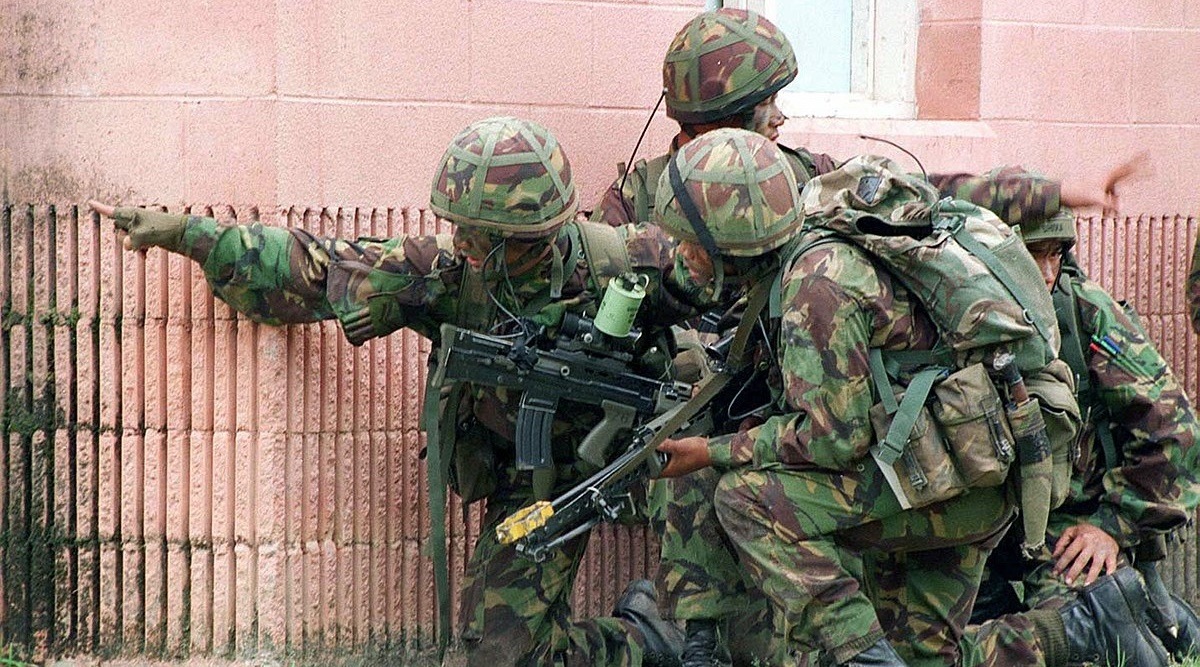 Ian had vast knowledge about the history of Gorkha recruitment in the British Army that began in 1816. (Source: Lance Cpl CD Clark/Wikimedia Commons/Representational photo)
Ian had vast knowledge about the history of Gorkha recruitment in the British Army that began in 1816. (Source: Lance Cpl CD Clark/Wikimedia Commons/Representational photo)The year was 1984. Ian Jack, the recently deceased British journalist and author, was in Bihar to write on the general election. He would observe minor details and ask me what people said in Hindi about the likely outcome of the polls. He would insist on knowing the caste composition of constituencies and how it affected the poll outcome. For me, a rookie reporter who had joined the profession just two years earlier, discussing poll issues with this celebrity was not at all comfortable. But there was hardly a silent moment in that seven-hour car journey from Patna to East Champaran on the Nepal border.
I belonged to Chitwan district on the other side of the border. Ian had vast knowledge about the history of Gorkha recruitment in the British Army that began in 1816. He knew about the demand for equal pension when they retired at par with fellow British soldiers. He spoke about their deployment in the Falkland war. He had been to Nepal just once. But that trip turned out to be a bit of embarrassment as he was forced to cut short the trip and return to his base in Delhi — he had caught diarrhea and missed his appointment with King Birendra, having had to spend more time in the “royal loo”, as he put it.
I first met Ian in 1983 at the UNI office in Patna. He had returned from Jharia, Dhanbad, where a few miners had died in a mine cave-in. He now wanted to know more about a much-talked-about story. Boka Thakur, a visually disabled and speech-challenged person from Madhubani district, arrested on a murder charge during British rule, was in jail as an under-trial prisoner till 1982. He had been released after his story hit the headlines and the high court intervened. But freedom had only made his life more uncertain. It was while discussing the life of Thakur at Patna’s modest Hotel Chanakya that Ian developed acute abdominal pain. Farzand Ahmed of India Today called a senior physician who advised us to rush him to the hospital. We took him to Holy Family Hospital in Kurji, where they removed his appendix. When I visited him in hospital post-operation, he asked me in a feeble voice: “Where am I?” He was soon in his elements as his wife Aparna flew down from London and friend The Telegraph editor M J Akbar arrived from Calcutta.
Once fit to travel, Ian returned to Patna to travel to Motihari. The year 1984 was just a few weeks away and he wanted to find out more about George Orwell’s birthplace. He met a few old people who showed him the site where the opium godown that employed British officer Richard Blair once stood. Richard’s son Eric, later George Orwell, was born there. On the same trip, he also went to Gaya to visit the Barabar Caves that E M Forster fictionalised as Marabar Caves in A Passage to India.
“Are you ready to get arrested for travelling without a ticket?” he asked me as we boarded the Patna-Gaya Express (2PG) for the two-hour journey on metre gauge. Besides a visit to the cave, Ian also wanted a first-hand experience of coal engines, which were on the way out in India. He was carrying a letter from the office of the Minister of Railways that instructed the staff to help him. He once took a train without reservation and had to bribe the ticket collector, who later found out that Ian was on the way to meet the then railway minister, A B A Ghani Khan Choudhury, in Malda. The TT came up to him and pleaded not to tell the minister about the incident. Ian could not finish that particular book. When he sent me his book, Before the Oil Ran Out, there was a hand-written note that mentioned this was not the book “I was trying to write when I met you”.
Full of nostalgia about India, he had a way of teasing friends without offending them. During one of his visits to Delhi in the mid-90s, Ian handed me a note that I was to deliver to Outlook editor, Vinod Mehta. On top of the envelope, he wrote Vinod Mehta B A and told me not to ask why but to observe his reaction. Vinod had a wry smile when he took the envelope. I understood the joke only years later when Vinod wrote self-deprecatingly about his grades and academic qualifications in his memoir, Lucknow Boy. Ian always made it a point to find time to connect with old friends and acquaintances during his visits to India — for instance, he continued to be in touch with the doctor in Patna who had treated him for appendicitis.
Ian headed the literary magazine, Granta, a decade ago after heading it for 12 years. The management wanted him to continue but he chose to quit to focus more on writing. In one of his last messages to me, he said: “I would love to come to Nepal. It sounds both fascinating and ominous. I don’t know when I will be able to make it though because I need somebody to pay the fare and the days of rich newspapers are drawing to a close, at least in Britain and the USA.”
The writer is a senior journalist based in Kathmandu